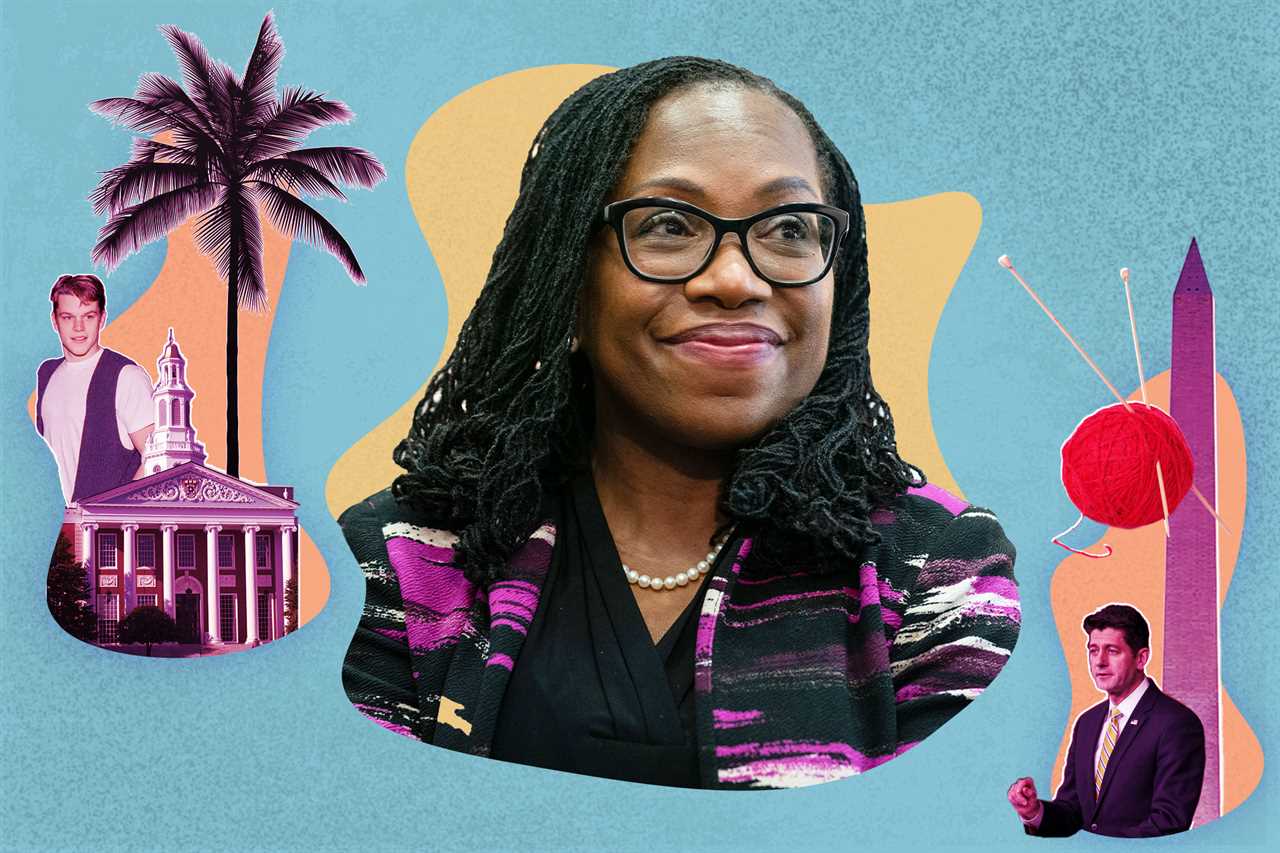
If Ketanji Brown Jackson is confirmed to the Supreme Court following her four-day hearing, she will achieve two firsts. She would become the first Black woman to sit on the court, bringing the number of women on the panel to four for the first time. She would also be the first justice who had served as a public defender, notable because the judiciary in general draws so heavily from the prosecution side of the courtroom.
What do Americans need to know as Jackson goes under the microscope to replace the retiring Justice Stephen Breyer? Here, culled from speeches, media coverage and Judiciary Committee questionnaires, is a primer on the life of Ketanji Brown Jackson, President Joe Biden’s first nominee to the highest court.
1.
Ketanji Brown Jackson was born in Washington, DC, in 1970.
2.
Jackson’s aunt — based in West Africa with the Peace Corps at the time of her birth — sent her parents a list of African girls’ name options, from which they picked ‘Ketanji Onyika,’ meaning “Lovely One.”
3.
Jackson credits her early interest in the legal profession to her dining table study sessions with her father while he was at law school and she was at preschool in Miami: “He had all of his law books stacked up, and I had all of my coloring books stacked up.”
4.
Both her parents had attended segregated primary schools and HBCUs before rising through the ranks of the Miami-Dade Public School system.
5.
Her parents kept a copy of civil rights activist Derrick Bell’s Faces at the Bottom of the Well: The Permanence of Racism on their coffee table for many years. Looking at the cover as a child, she “found it difficult to reconcile the image of the person, who seemed to be smiling, with the depressing message that the title and subtitle conveyed,” she said in a Martin Luther King Day speech at the University of Michigan in 2020.
6.
At her public school, Miami Palmetto Senior High, Jackson was elected student body president. She was also a speech and debate star — the activities that she says best prepared her “for future success in law and in life.”

7.
Amazon CEO Jeff Bezos (class of ’82) is a fellow alumnus of Palmetto and a member of the school’s alumni hall of fame. Jackson (class of ’88) has not been inducted yet.
8.
When former Republican U.S. Secretary of Energy and Secretary of the Interior Donald Hodel visited Miami in October 1987, Jackson — then a high school student — pressed him on why the department permitted offshore oil drilling, putting coral reefs at risk. “Oil and water don’t mix,” she quipped.
9.
When Jackson voiced her goal to attend Harvard, her high school counselor told her she shouldn’t set her “sights so high.” She later graduated magna cum laude from Harvard University, and cum laude from Harvard Law School, where she was an editor of the Harvard Law Review.
10.
Matt Damon was her assigned partner during a drama course she took one semester at Harvard. “Although I was pretty good, I doubt he’d remember me now,” she said.
11.
In her freshman year, one of her classmates hung a Confederate flag outside of his dorm window located in the center of campus. An active member of the Black Students Association, Jackson was involved with organizing rallies, sit-ins, petitions and flyers in protest.
12.
Commenting on a 1990 student protest demanding more faculty in Harvard’s Afro-American Studies department, Jackson, a senior at the time, said, “We can embarrass the university in front of the alumni.”
13.
Three Black women she met in her freshman year — who became her roommates — also applied and got into Harvard Law School.
14.
Between her Harvard degrees, she worked briefly as a staff reporter and researcher at TIME Magazine.
15.
In 1996, she married her husband, Patrick, whom she met while studying at Harvard, now a surgeon at MedStar Georgetown University Hospital. She has labeled them an “unlikely pair”, describing him as “the quintessential Boston Brahmin.” The couple has two daughters, Leila and Talia.
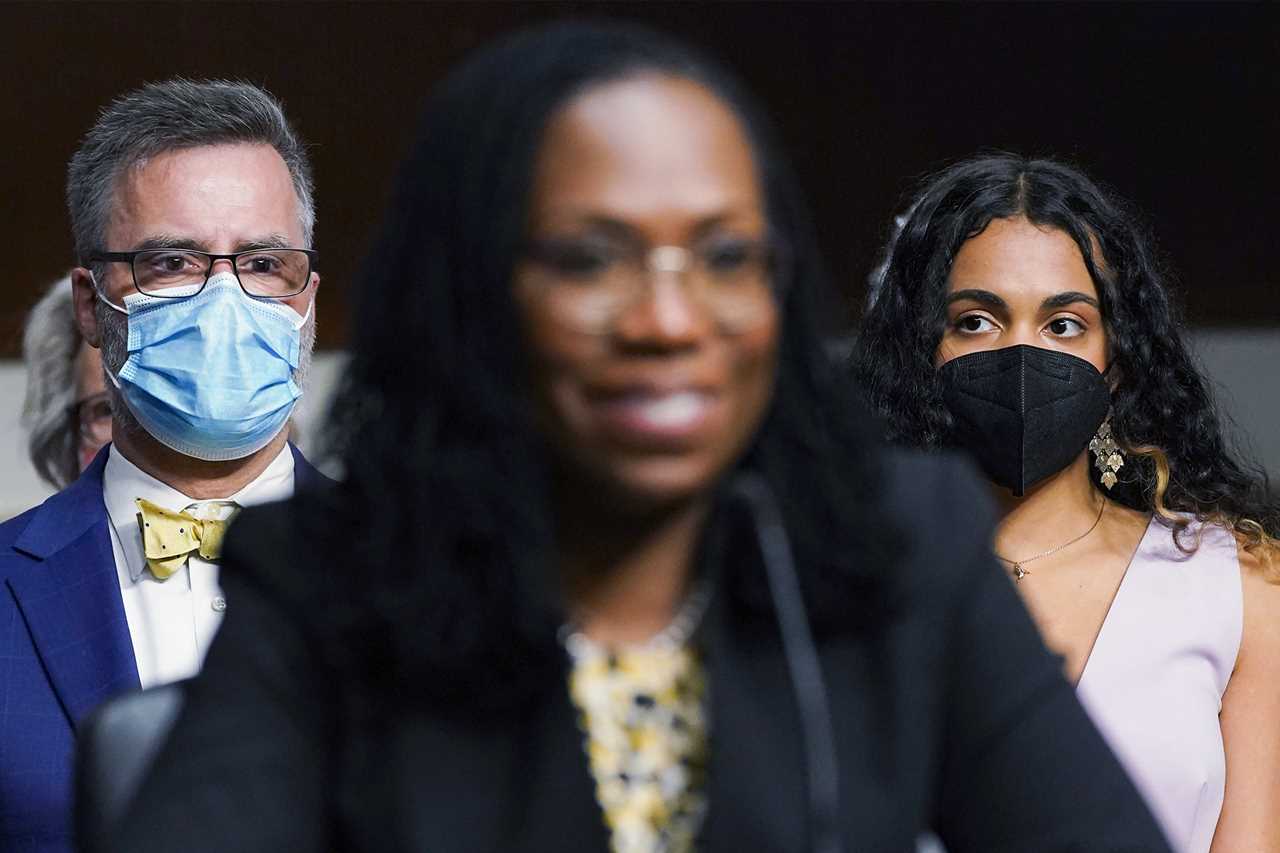
16.
Following two clerkships under U.S. District Court Judge for the District of Massachusetts Patti B. Saris and U.S. Court of Appeals Judge for the First Circuit Bruce M. Selya, she entered private practice in order to cover “rent, and bills, and law school loans,” taking a job at a boutique DC law firm.
17.
She worked at the firm for nine months before leaving to serve as a clerk for Supreme Court Justice Stephen Breyer between 1999 and 2000.
18.
At the Supreme Court, she regularly worked 14 to 16 hour days. “I feel so lucky to have had the chance to work inside an institution that has such a significant impact on the lives of Americans and that few people even get to see, much less to be part of,” she said in 2017.
19.
Three months pregnant, she followed her husband to Boston, where he was completing his surgical residency, and took a job as an associate at Goodwin Procter LLP. She found meshing her work schedule and new life as a mother “extremely challenging,” and embarked on a “professional odyssey of epic proportions,” moving from job to job to find a position that better suited the needs of her family.
20.
Jackson’s uncle, Thomas Brown Jr., was sentenced in 1989 to life in prison in Florida for a nonviolent drug offense. In 2005, he appealed to her for help, sending her a thick packet of court documents. On her referral, a law firm took on his case, and President Barack Obama later commuted his sentence.
21.
Her uncle, Calvin Ross, formerly served as Miami’s police chief.
22.
Between 2005 and 2007, Jackson served as an assistant federal public defender in D.C. If confirmed, she would be the first former federal public defender to serve on the Supreme Court.
23.
While a public defender, Jackson represented a terrorist who was a Guantanamo Bay detainee. During her Court of Appeals confirmation process, Sen. Tom Cotton asked her whether she had represented a terrorist, whether the case was assigned to her, and who the client was.
24.
In 2008, she served as a poll monitor for the Obama campaign with Lawyers for Change during the primary and general elections.
25.
Jackson served as vice chair and commissioner of the U.S. Sentencing Commission between 2010 and 2014. During the confirmation process, she knitted to calm her nerves. “If anybody wants a scarf, I’m your source,” she said in a 2017 lecture.
26.
While she was vice chair, the Sentencing Commission enacted a law that narrowed the gulf between sentence severity for crimes related to crack cocaine and powdered cocaine. The body also penned the Drugs Minus Two Amendment, reducing the offense level for drug crimes by two degrees. This resulted in more than 30,000 retroactive sentence reductions.
27.
In 2012, Obama nominated her for a D.C. District Court judgeship. Her confirmation chances depended on the former president’s reelection, so the evening of Nov. 6 was a tense one for Jackson. Retreating to the one place she knew would have no connectivity with the outside world, she indulged in a “variety of services” at Elizabeth Arden’s Red Door Spa.
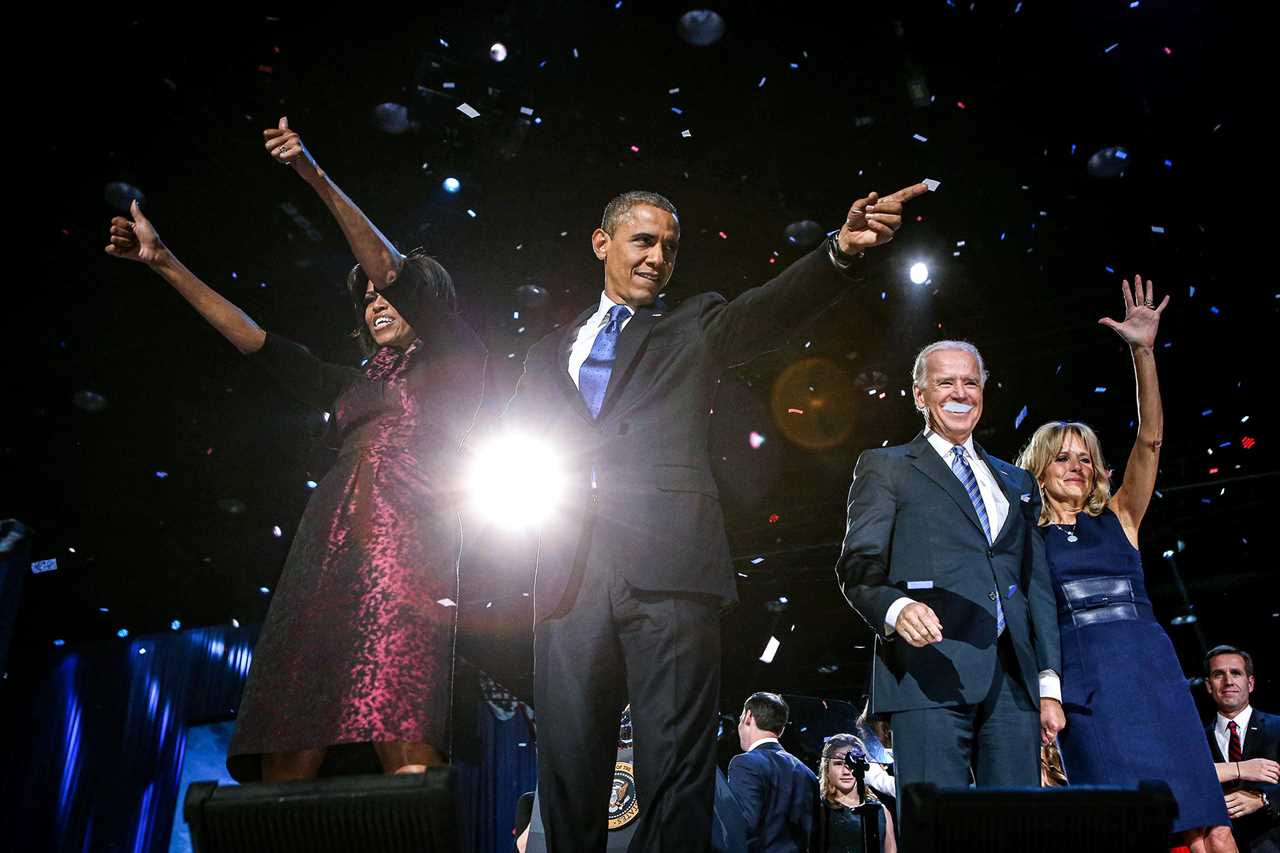
28.
She was confirmed to the D.C. District Court on a bipartisan basis in 2013.
29.
In 2015, she ruled that D.C. Corrections owed damages to a deaf former inmate for failing to provide him with adequate equipment. She wrote that the District’s “willful blindness regarding Pierce’s need for accommodation and its half-hearted attempt to provide Pierce with a random assortment of auxiliary aids—and only after he specifically requested them—fell far short of what the law requires.”
30.
Obama interviewed her as a potential candidate for nomination for the Supreme Court after the death of Justice Antonin Scalia in 2016.
31.
Jackson sentenced the “Pizzagate” gunman to four years in prison in 2017. Though nobody was injured, she argued Edgar Maddison Welch “left psychological wreckage” when he shot a gun inside Comet Ping Pong based on the rumor that Democrats were running a child sex ring from the restaurant’s basement.
32.
In 2018, she ruled against three Trump executive orders related to the federal workforce, including one that made it easier for federal employees to be fired. She wrote that the defendants’ analysis of the law was akin to “verbal jujitsu.”
33.
She dismissed pending wrongful death cases related to missing Malaysia Airlines flight MH370 on the grounds that Malaysia was a more convenient forum for them. “Verdict on Ketanji Brown Jackson: ‘Supreme’-ly heartless” read a New York Post headline","_id":"0000017f-a7d6-d5d4-a97f-a7d6588a0000","_type":"02ec1f82-5e56-3b8c-af6e-6fc7c8772266"}">New York Post headline this month in response to her handling of the case.
34.
In 2019, she blocked the Trump administration from expanding its powers to fast-track the deportation of undocumented immigrants via an “expedited removal” process. Officials targeted undocumented immigrants anywhere in the U.S. who could not prove they had been in the country continuously for two years. This widened the fast-track mechanism’s remit — established in 2004 by the Department of Homeland Security under then-President George W. Bush — that had applied to undocumented immigrants who encountered law enforcement within 100 miles of the U.S. border and entered the U.S. in the prior 14 days. Her injunction was later reversed.
35.
In perhaps her most famous opinion, Jackson in 2019 declared that former White House aide Don McGahn did not have immunity from testifying over Trump’s potential obstruction of the Special Counsel investigation into Russian election interference. “Presidents are not kings,” she wrote in her 120-page decision.
36.
One of her favorite poems is The Ladder of St. Augustine by Henry Wadsworth Longfellow. She says it speaks to the discipline necessary to succeed in law:
"The heights by great men reached and kept / Were not attained by sudden flight, / But they, while their companions slept, / Were toiling upward in the night."
37.
She authored 578 opinions while on the D.C. District court, and 10 decisions were reversed. Supreme Court Justice Brett Kavanaugh authored two of these reversals.
38.
She was confirmed to the U.S. Court of Appeals for the D.C. Circuit in 2021 after being nominated by Biden. Republicans Lindsey Graham, Susan Collins and Lisa Murkowski voted with Democrats to confirm her. “I think I try to be somewhat consistent here. I think she's qualified for the job. She has a different philosophy than I do,” said Graham, previously the Senate Judiciary Committee chair.
39.
In 2021, she was presented with the Constance Baker Motley Award, named after the late judge with whom Jackson shares a birthday — Sept. 14.
40.
Jackson was part of the three-judge panel of the U.S. Court of Appeals for the D.C. Circuit that last December unanimously upheld a decision by U.S. District Judge Tanya S. Chutkan rejecting Trump’s attempt to shield White House papers from a committee investigating the Jan. 6 Capitol riot. “Lives were lost; blood was shed,” wrote fellow panelist Patricia Millett in the opinion. “There is a direct linkage between the former President and the events of the day.”
41.
In her debut appeals court ruling, decided Feb. 1, she sided with labor unions as she blocked an attempt by the Federal Labor Relations Authority to raise the requirements for unions to be able to bargain with employers.
42.
Republicans have raised concerns that Jackson’s race could influence her decision making. During her D.C. Court of Appeals confirmation process, Republican Sen. John Cornyn asked “What role does race play, Judge Jackson, in the kind of judge you have been and the kind of judge you will be?” to which Jackson responded that race “would be inappropriate to inject in my evaluation of a case.”
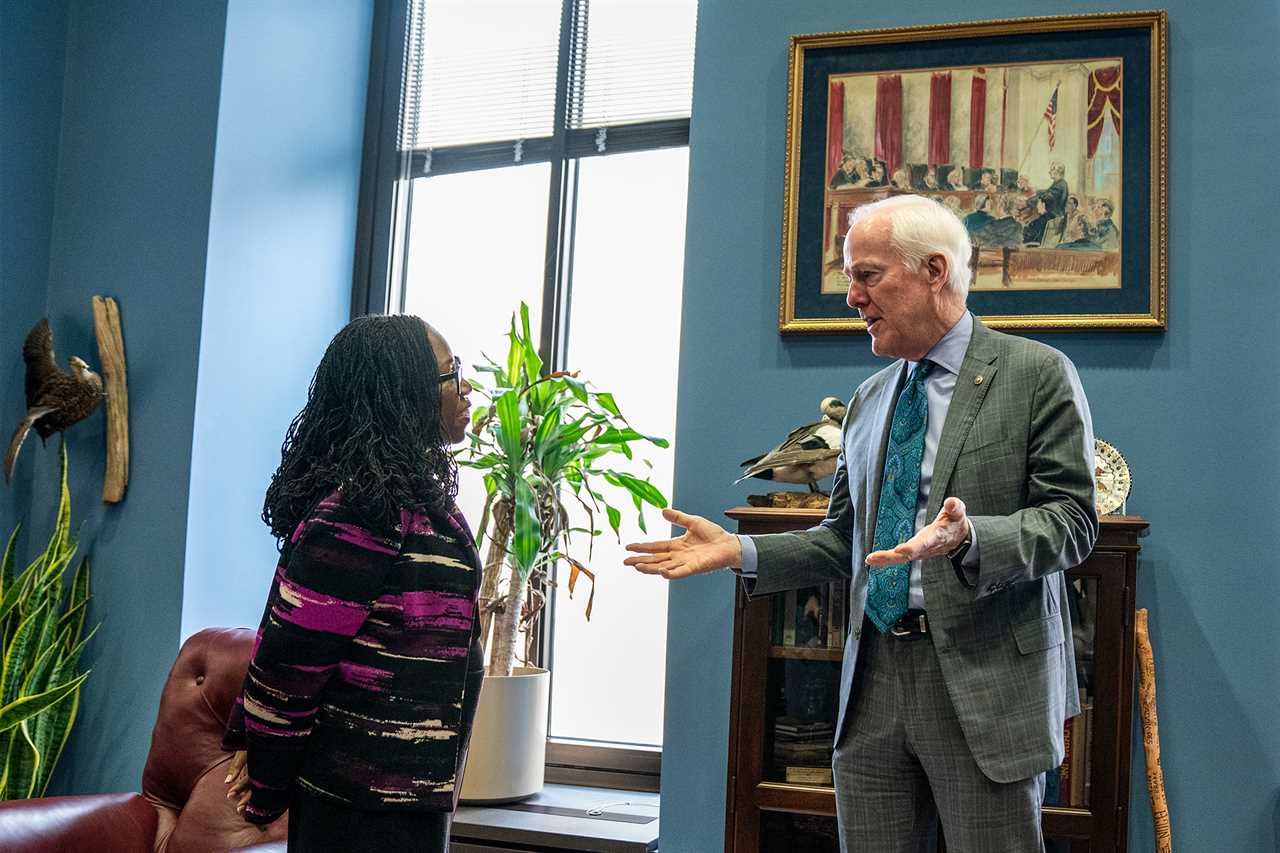
43.
She is related by marriage to former Republican vice presidential candidate and House Speaker Paul Ryan: Jackson’s husband’s brother is married to Ryan’s wife’s sister.
Upon Jackson’s nomination to the Supreme Court, Ryan tweeted his support: “Our politics may differ, but my praise for Ketanji's intellect, for her character, and for her integrity, is unequivocal.”
44.
During her speech after being nominated in February, she addressed the retiring Justice Breyer directly: “The members of the Senate will decide if I fill your seat, but please know I could never fill your shoes.”
45.
The day before meeting her, Senate Minority Leader Mitch McConnell expressed doubts about her experience and supporters: “I am troubled by the combination of this slim appellate record and the intensity of Judge Jackson’s far-left dark-money fan club.”
46.
Earlier this month, Tucker Carlson asked to see her test scores for admission to Harvard. “It might be time for Joe Biden to let us know what Ketanji Brown Jackson’s LSAT score was,” he said. “It would seem like Americans in a democracy have a right to know that.” In 2020, the median LSAT score for Harvard Law was 173 (out of 180), tied for first nationally.
47.
The week before Jackson’s confirmation hearing, Sen. Josh Hawley composed an 18-Tweet long thread slamming Jackson for her handling of child pornography cases. “Judge Jackson has a pattern of letting child porn offenders off the hook for their appalling crimes,” he wrote.
48.
The White House responded, branding his thread as “toxic and weakly-presented misinformation that relies on taking cherry-picked elements of her record out of context.”
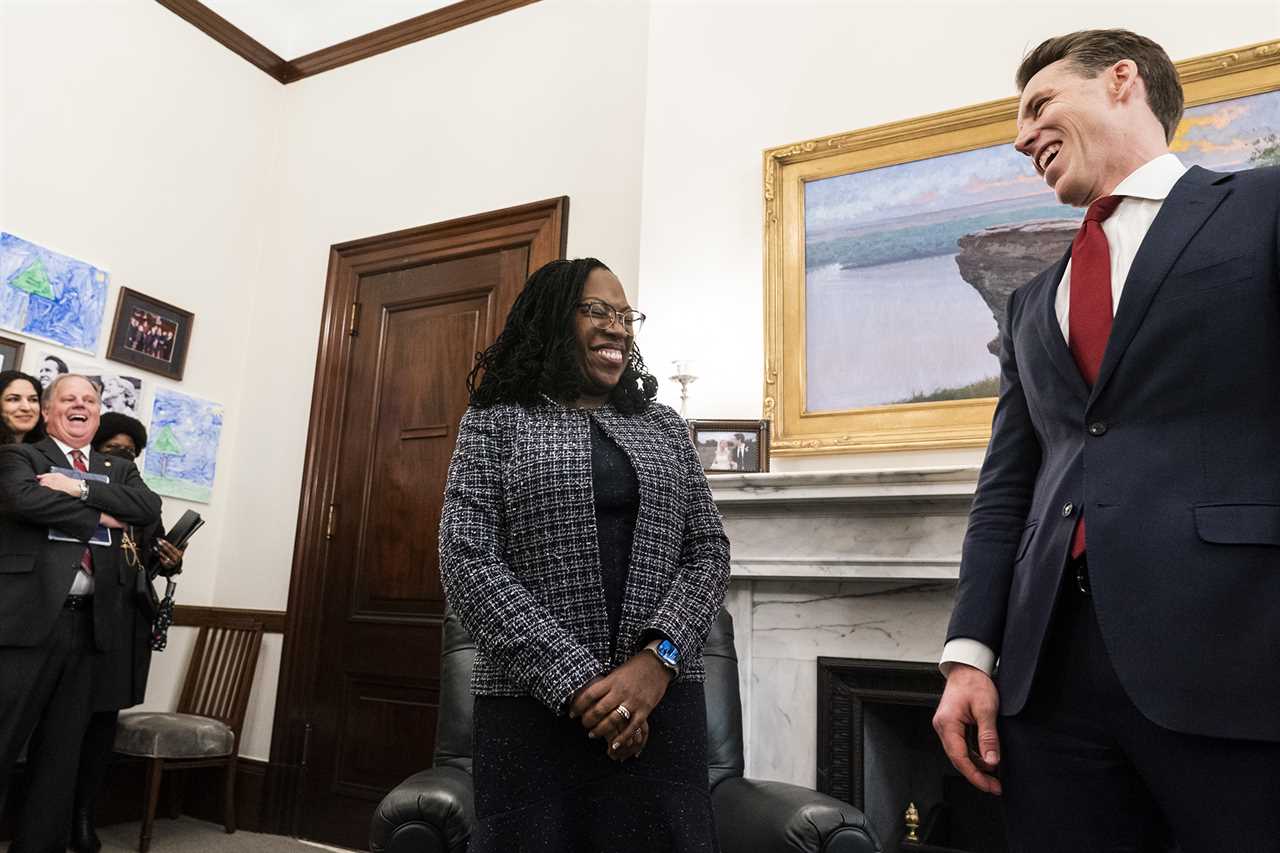
49.
Jackson’s current seat on the Harvard Board of Overseers may mean she recuses herself from one of the first major cases she would face as a Supreme Court justice — a challenge to the university’s admissions practices alleging that Asian American students are rejected at a disproportionately high rate.
50.
A number of women inspire her to “keep putting one foot in front of the other every day”: Sojourner Truth, Harriet Tubman, Belva Lockwood, Susan B. Anthony, Constance Baker Motley, Amelia Earhart, Marie Curie, Indira Gandhi, Barbara Jordan, Shirley Chisholm, and Eleanor Roosevelt.
51.
Her brother, Ketajh Brown, is a commercial lawyer with K&L Gates. The pair sometimes refer to themselves as only children because of their 10-year age gap.
52.
“Do what you need to do before what you want to do” is a motto in her household.
53.
She is a member of the Cosmos Club, a private social club for distinguished professionals. The RNC called it “a club of the Washington elite.”
54.
Jackson and her husband are “long-suffering, early to bed, early to rise kind of people.”
55.
She credits three factors with her success: “hard work, big breaks, and tough skin.”
----------------------------------------
By: Ella Creamer
Title: 55 Things You Need to Know About Ketanji Brown Jackson
Sourced From: www.politico.com/news/magazine/2022/03/21/55-things-you-need-to-know-about-ketanji-brown-jackson-00018514
Published Date: Mon, 21 Mar 2022 03:30:00 EST






